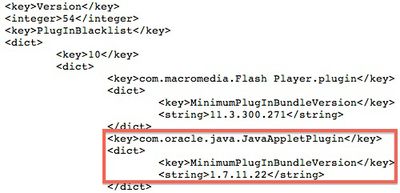Apple Once Again Blocks Java 7 Web Plug-in
Earlier this month, Apple took the unusual step of remotely blocking Oracle's Java 7 browser plug-in due to a major security vulnerability, using the "Xprotect" anti-malware system built into OS X to enforce a minimum version number that had yet to be released. Within days, Oracle updated Java to address the issue, with the new version number making the Java plug-in usable on OS X systems once more.
As noted by French site MacGeneration [Google translation] and the Apple discussion forums, Apple has once again blocked the Java 7 plug-in using Xprotect.

The updated blacklist enforces a minimum Java plug-in version of 1.7.0_11-b22, while the latest version of the plug-in is 1.7.0_11-b21.
The exact reason for Apple's renewed block on the Java plug-in is unknown although reports immediately following the release of Update 11 earlier this month indicated that it fixed only one of the two bugs that contributed to the security vulnerability. In the wake of that news, cybersecurity officials recommended that most users disable Java even with the up-to-date plug-in installed.
Oracle Security Alert CVE-2013-0422 states that Java 7 Update 11 addresses this (CVE-2013-0422) and an equally severe, but distinct vulnerability (CVE-2012-3174). Immunity has indicated that only the reflection vulnerability has been fixed and that the JMX MBean vulnerability remains. Java 7u11 sets the default Java security settings to "High" so that users will be prompted before running unsigned or self-signed Java applets.
Unless it is absolutely necessary to run Java in web browsers, disable it as described below, even after updating to 7u11. This will help mitigate other Java vulnerabilities that may be discovered in the future.
If this continued issue is indeed the reason for the new block by Apple, it is unclear why the company waited several weeks to update its plug-in blacklist.
Popular Stories
Despite being more than two years old, Apple's AirPods Pro 2 still dominate the premium wireless‑earbud space, thanks to a potent mix of top‑tier audio, class‑leading noise cancellation, and Apple's habit of delivering major new features through software updates. With AirPods Pro 3 widely expected to arrive in 2025, prospective buyers now face a familiar dilemma: snap up the proven...
Apple plans to release an all-new super thin iPhone this year, debuting it alongside the iPhone 17, iPhone 17 Pro, and iPhone 17 Pro Max. We've seen pictures of dummy models, cases, and renders with the design, but Lewis Hilsenteger of Unbox Therapy today showed off newer dummy models that give us a better idea of just how thin the "iPhone 17 Air" will be.
The iPhone 17 Air is expected to be ...
If you missed the video showing dummy models of Apple's all-new super thin iPhone 17 Air that's expected later this year, Sonny Dickson this morning shared some further images of the device in close alignment with the other dummy models in the iPhone 17 lineup, indicating just how thin it is likely to be in comparison.
The iPhone 17 Air is expected to be around 5.5mm thick – with a thicker ...
A developer has demonstrated Windows 11 ARM running on an M2 iPad Air using emulation, which has become much easier since the EU's Digital Markets Act (DMA) regulations came into effect.
As spotted by Windows Latest, NTDev shared an instance of the emulation on social media and posted a video on YouTube (embedded below) demonstrating it in action. The achievement relies on new EU regulatory...
Apple's iPhone development roadmap runs several years into the future and the company is continually working with suppliers on several successive iPhone models simultaneously, which is why we often get rumored features months ahead of launch. The iPhone 17 series is no different, and we already have a good idea of what to expect from Apple's 2025 smartphone lineup.
If you skipped the iPhone...
While the iPhone 17 Pro and iPhone 17 Pro Max are not expected to launch until September, there are already plenty of rumors about the devices.
Below, we recap key changes rumored for the iPhone 17 Pro models as of April 2025:
Aluminum frame: iPhone 17 Pro models are rumored to have an aluminum frame, whereas the iPhone 15 Pro and iPhone 16 Pro models have a titanium frame, and the iPhone ...
Apple seeded the third beta of iOS 18.5 to developers today, and so far the software update includes only a few minor changes.
The changes are in the Mail and Settings apps.
In the Mail app, you can now easily turn off contact photos directly within the app, by tapping on the circle with three dots in the top-right corner.
In the Settings app, AppleCare+ coverage information is more...






















